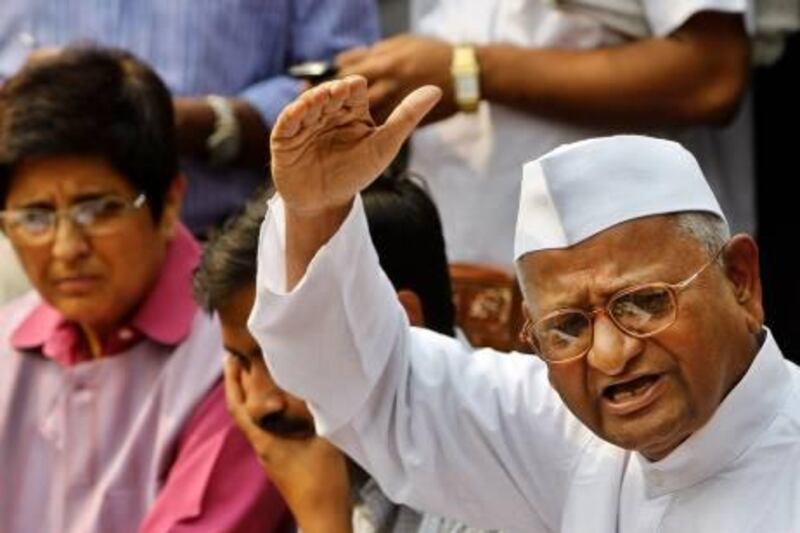BAMBOLIM, GOA // The leaders of India's anti-corruption movement have accused the government of a smear campaign designed to save it from creating a powerful watchdog.
The group, led by Anna Hazare, 74, a self-styled Gandhian activist, rocked the political establishment in April and July when Mr Hazare began hunger strikes that inspired tens of thousands of people to take to the streets.
The government has agreed "in principle" to their demands for anti-corruption legislation known as the "Lokpal bill", but it was unclear whether its version would be powerful enough to satisfy the movement's leaders.
The government has been helped in recent weeks by a series of minor scandals involving key members of "Team Anna".
But Arvind Kejriwal, considered the prime architect of the anti-corruption campaign, claimed these were part of a smear campaign by the government.
"Systematically, each member of our team has been targeted," he told an audience at the Think Fest conference in Goa yesterday.
"We are being hounded out, our phones tapped and our past lives are being dug up."
Kiran Bedi, a leading figure in Team Anna, was found to have diverted thousands of dollars in travel expenses for speaking engagements.
She said the money went straight back into her NGO and called the charges of corruption "silly" and "stupid".
On Thursday, Mr Kejriwal was forced to repay a US$18,000 (Dh66,116) government bond, owed since he quit his job as an income tax employee several years ago.
He made the repayment under protest, saying he had continued to work for his country as an activist and should not have to return the loan.
"These attempts to fragment the movement are an indicator of the power of the movement and the nervousness of the government," said Ashis Nandy, one of India's most renowned political commentators. "Whatever the government does, it won't make any difference.
"The people's grievances have been accumulating for something like 30 years. Anna didn't create the movement - the public created Anna."
Meanwhile, Mr Hazare ended a 19-day vow of silence on Friday to threaten the Congress-ruled government with a third hunger strike and a political campaign should it fail to introduce the promised anti-corruption bill in the next session of parliament, which starts on November 22.
"I will go and ask people not to vote for the Congress if a strong bill is not passed," Mr Hazare said.
He was referring to elections in five states next year - including India's most populous, Uttar Pradesh. These are seen as a bellwether of the government's popularity ahead of general elections in 2014.
Last month, Mr Hazare campaigned against Congress in a by-election in Haryana, which resulted in its candidate receiving so few votes that he lost his deposit.
"If Anna can make a dent on just five per cent of voters in each constituency, that's enough to tip the scales," said Pratap Bahnu Mehta, president of the Centre for Policy Research, a Delhi-based think tank.
Mr Kejriwal yesterday defended the movement's foray into elections, saying it had no choice.
"We are not anti-Congress," he said. "But they are the ruling party. They are the only ones that can pass a strong Lokpal bill. We are simply pleading with them to do so."
Legislation to create an anti-corruption watchdog was first introduced in parliament in 1967 but has never been passed.
Team Anna says this inertia is proof of the need for more radical action, even if it means undermining India's parliamentary processes.
"There is a direct conflict of interest in parliament because many of the people who are supposed to enact this bill would go to jail if they did so. That is why we have to engage the citizens directly," said Mr Kejriwal.
Even if the bill is passed, there are serious doubts about whether a watchdog could deal with the causes of corruption.
Many fear it would simply add another layer of corrupt bureaucracy to India's mess of red tape.
"A new monolithic structure of investigation and inquiry will itself create new sources of corruption," said Mr Nandy. "Perhaps it will create another billionaire."
foreign.desk@thenational.ae
Corruption critics accuse India of attacking them to avoid watchdog
India's government has been helped in recent weeks by a series of minor scandals involving key members of a group pushing for passage of a tough anti-graft law.

Editor's picks
More from the national




